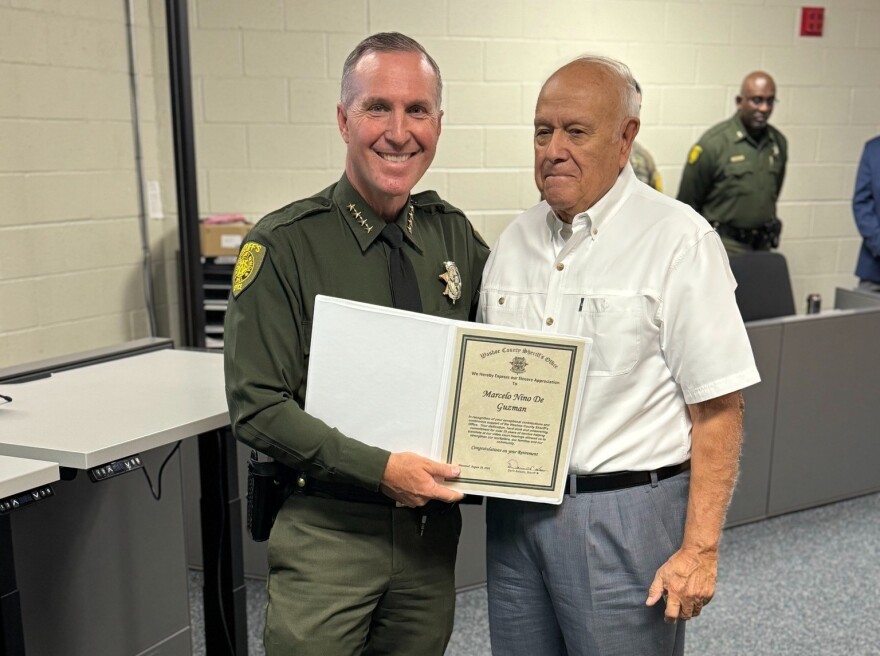Marcelo Nino De Guzman has been helping Reno’s Spanish-speaking community with his language skills for decades.
As an experienced translator, Nino De Guzman has worked for various organizations over the years, but takes pride in helping incarcerated individuals understand the complexities of the justice system. He often explains legal terms, prison rules and offers a human connection in their darkest moments.
At the Washoe County Detention Center, Nino de Guzman’s week began early in the morning.
“In prison I started at eight o’clock until about 10 o’clock. My job was to read them, in Spanish, their constitutional rights, to explain each point of them so that they were aware of what was happening and what they could do,” said Nino De Guzman.
He will then translate the communication between the defense attorney and the prisoner.
“After that, [I’d] wait for the defense attorney to call them beforehand and [I’d] talk to them and interpret what the defense attorney is going to say and try to tell them,” he said.
This was Nino de Guzman’s life for 25 years.
He was born in Oruro, Bolivia, a mining town. He attended an Anglo-American school where English was the primary language, setting the foundation for his future.
When a high school teacher wrote him a letter of recommendation, it opened the door for Nino De Guzman to immigrate to the United States in the early 1960s.
His first stop was Cleveland, Ohio, where he worked before enlisting in the Marine Corps in 1962. For four years, Nino De Guzman served around the world, including in Japan and Puerto Rico.
After his military service, Marcelo returned briefly to Bolivia, where he got engaged. Settling in Richmond, Virginia, he pursued a degree in business administration at the University of Richmond. He later returned to Bolivia to work for a company representing American brands before settling in Reno, Nevada in the early 1980s.
“[When] we started here in Reno, I worked for the Latino Center, which was an office that helped with the small Latino population, trying to get them jobs, translations, interpretations and different areas,” Nino De Guzman said.
In 1988, Nino de Guzman was offered his first job as an interpreter in the courts of Reno and Sparks.
“I was walking [in] in downtown Reno and I ran into a gentleman who was a lawyer at the time and he asked me if I could help him work as a translator. And that’s why my career as a translator started,” he said.
But it wasn’t until a few years later that he started going to prison.
“Throughout that time, I’ve met a lot of people with different needs, good people, I can tell they’ve been in jail because of a mistake in life, like everybody does traffic citations and things like that, or worse, things that happen in life. But they are human beings. And [you] try to help them in the best way possible,” said Nino de Guzman.
Interpreting for so many years allowed him to really get to know his community. It catered to people of diverse Latino backgrounds.
“I can say that I really enjoyed this thing because they made me feel like I was doing something for people that they really needed. And as a result, I can tell you that everywhere I go right now, somebody talks to me and says, ‘Hey, how are you?’ I ask them, hey, how do I know you?” Nino De Guzman said.
The hardest part of the job was some of the inmates’ personalities, he said, and the little education some of them had. But overall it was a very rewarding job.
“They find out where I live and knock on my door and offer services as landscapers or painters or things like that because I helped them when they were in custody,” Nino de Guzman said.
He still receives thanks from those he helped, said his wife, Cecilia Nino de Guzman.
“This was not just a translation. He joked around and made good friends and that’s why they miss him so much to this day. He made so many friends. They still come and knock on our doors and say, “Thank you, can I help you with this?” But something else that’s very important is that they say, “God bless you for what you’ve done.” , she said as her eyes filled with tears.

Washoe County Sheriff’s Office.
Nino De Guzman now enjoys the flexibility of his retirement, which allows him to spend more time with his family and travel to Bolivia.
He also advised the Hispanic community to continue to work hard, educate themselves and send their children to school to ensure a better future.
“Just keep working hard. Educate your children, send them to school, do the best we can, and that’s why we came to this country and I think that’s what we’re doing. There is no doubt about that. The Hispanic community is on the rise,” said Nino de Guzman.
